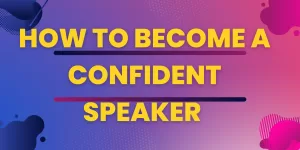A lot of people want to be good speakers that can deliver good speech to motivate and influence their listeners like Barrack Obama, Oprah Winfrey, Sam Adeyemi, Fela Durotoye.
Sadly, not many can face a crowd or articulate their words when the opportunity is presented to them.
So, if you really want to become a confident speaker, you need to say goodbye to some habits.

Becoming a great speaker is not so difficult but it requires a lot of practices and discipline. Speaking in front of people can be scary but it can also be fun and awesome.
So, want to be great at speaking in front of people?
Then let’s jump straight into it
In this article, we shall look at habits an individual must avoid in order to speak confidently in public.
Have You Read: Latest Black Market Naira To Dollar Exchange Rate
See 5 Habits You Must Avoid To Be A Confident Speaker
- Stop Saying “Um,” “Uh,” and “You Know” Way Too Much
Using filler words like “um,” “uh,” and “you know,” does not show that a speaker is confident.
These words are often used when people are scared, nervous, thinking or just trying to keep the conversation going.
Why This is a Problem:
You see, every “um” takes away from the great stuff you’re actually trying to say. People want to hear your ideas, not your “ums.”
How to Break It:
Practice Makes Perfect: Record yourself speaking and play it back. Every time you hear an “um,” that’s a sign to tighten things up.
Pause: Instead of filling the silence with “um,” just pause. Take a breath. It gives you a moment to think and looks way more confident.
- Avoiding Eye Contact
Imagine you’re up in front of a room, and suddenly the floor seems way more interesting than the sea of eyes staring back at you.
You would obviously have given your audience a reason to believe that you lack confidence in yourself and you will gradually start losing them.
Eye contact makes you seem sure of yourself, and it also makes your audience to connect with you.
Why This is a Problem:
When you avoid eye contact, people might think you’re hiding something or that you’re not confident in what you’re saying.
Your words could be golden, but if you’re not making that eye-to-eye connection, you’re losing out.
How to Break It:
The 3-Second Rule: Make eye contact with someone for about 3 seconds before moving on to the next person. Long enough to connect, but not too long that it becomes awkward.
Practice with Friends: Before you hit the big stage, practice making eye contact when talking with friends and family. Ask them for feedback. Did it feel natural? Too intense? Adjust accordingly.
By making eye contact, you’re not just looking at people; you’re connecting with them. And that’s what confident speaking is all about!
- Trying to Be Perfect
Wait, isn’t the goal to give the perfect speech, hit all the right points, and never make a mistake? Actually, no.
Striving for perfection is a trap. It’s stressful, and guess what? Audiences don’t want perfect. They want real, authentic you.
Why This is a Problem:
Aiming for perfection can make you super nervous because, let’s be honest, perfection is impossible.
And when you’re nervous, it shows. Instead of listening to your message, people are picking up on your anxiety.
How to Break It:
Embrace Mistakes: If you stumble over a word or lose your place, own it. A small hiccup can actually make you more relatable.
Focus on Value, Not Flawlessness:
Are you providing helpful or inspiring information? That’s what really matters, not whether you delivered it without a single “um” or pause.
Let go of the idea of a “perfect speech,” because perfection doesn’t equal connection. What people really resonate with is genuine emotion and authenticity.
You May Also Like: Sir Jim Ratcliffe Makes Man Utd ‘Failure’ Comment
- Speeding Through Your Speech
I can totally relate to this one. I used to think talking fast made me look smarter or more confident.
But you know what? It did just the opposite. People couldn’t keep up, and I lost them.
If you’re rushing through your words like you’ve got a plane to catch, it’s time to slow down.
Why This is a Problem:
Speed-talking can make you sound nervous or like you can’t wait to finish. It also makes it hard for your audience to digest what you’re saying.
Your message? Lost in the blur.
How to Break It:
Time Yourself: During practice, time your speech to make sure you’re not rushing. It can be eye-opening to see how fast you actually talk.
Breathe: It sounds simple, but taking deep breaths not only calms your nerves; it naturally slows down your speech.
Taking it slow isn’t a sign of insecurity; it shows that you value what you’re saying enough to let it sink in. And believe me, your audience will thank you for it.
